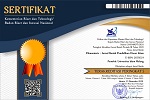PENGARUH MODEL WORD SQUARE BAGI SISWA MADRASAH IBTIDAIYAH DALAM PEMBELAJARAN ILMU PENGETAHUAN ALAM
DOI:
https://doi.org/10.33474/elementeris.v4i2.18088Abstract
Varied learning causes students to be more active in learning, and vice versa. If learning is not student-centered, students will tend to be passive and learning outcomes will also not be optimal. For this reason, teachers need to combine various learning models so that learning becomes more varied and not boring, one of which in this study uses the word square. This study aims to determine the effect of using the word square learning model on learning activity, learning outcomes, as well as student activity and learning outcomes simultaneously in science subjects. This research was conducted at MI Hidayatul Mubtadiin Wates Sumbergempol Tulungagung. The method used is a quasi-experimental research, with a sampling technique using probability sampling. The population and samples were the same, namely 38 students of class V MI Hidayatul Mubtadiin who were grouped into the experimental class and the control class. (1) The results of the activity questionnaire were obtained by Sig. 0.002 < 0.05, then Ha is accepted (2) the results of the T test of learning outcomes obtained Sig. 0.026 <0.05, then Ha is accepted (3) the results of the manova test, activeness questionnaires and learning outcomes tests are obtained by Sig. 0.007 < 0.05, then Ha is accepted. So it can be concluded that there are differences in activity, learning outcomes, as well as student activity and learning outcomes after using the word squarein science subjects.
References
Abidin, Z., Ramadhan, G. M., & Kusniawati, R. (2021). PENGARUH MODEL PEMBELAJARAN WORD SQUARE TERHADAP HASIL BELAJAR IPS SISWA SEKOLAH DASAR. Journal of Elementary School, 04(05), 804–811.
Adnyana, I. G. A. D., Margunayasa, I. G., & Kusmariyatni, N. (2019). Pengaruh Model Pembelajaran Word Square Berbantuan Media Gambar terhadap Hasil Belajar IPA. Jurnal Ilmiah Sekolah Dasar, 3(1), 79–88. https://doi.org/10.23887/jisd.v3i1.17661
Ayuningtyas, N. D., Darsana, I. W., & Kristiantari, R. (2019). PENGARUH MODEL PEMBELAJARAN WORD SQUARE TERHADAP PENGUASAAN KOMPETENSI PENGETAHUAN IPA SISWA KELAS V. Jurnal Pendidikan dan Pembelajaran IPA Indonesia, 9(1), 25-33.
Azizah, A. H., Awaliyah, B. R., & Lestari, S. L. (2022). Pengaruh Model Pembelajaran Word Square terhadap Hasil Belajar Tema 1 Sub Tema 1 Kelas 5 Di MI Nurul Huda. Mitra PGMI: Jurnal Kependidikan MI, 8(1), 29–36. https://doi.org/10.46963/mpgmi.v8i1.441
Harahap, P. (2019). Pengaruh Model Pembelajaran Word Square terhadap Hasil Belajar Siswa Kelas V Pada Mata Pelajaran Ilmu Pengetahuan Sosial (IPS) di MIN Sei Agul Medan Denai. Universitas Islam Negeri Sumatera Utara.
Hidayat, U. S. (2016). Model-Model Pembelajaran Efektif. Sukabumi: Yayasan Budhi Mulia Sukabumi.
Hisbullah, & Selvi, N. (2018). Pembelajaran Ilmu Pengetahuan Alam Di Sekolah Dasar. Makassar: Penerbit Aksara Timur.
Marsono. (2021). Pendekatan Scientific Model Crossword Puzzle. Pekalongan: Penerbit NEM.
Neli, Z., Fanni, Y., & Adiman. (2020). Pengaruh Model Pembelajaran Word Square Terhadap Hasil Belajar IPA Pokok Bahasan Benda dan Perubahan Benda Pada Siswa Kelas V SD Negeri 1 Palir Kecamatan Tengah Tani Kabupaten Cirebon. Jurnal Pendidikan Fisika Dan Sains (JPFS), 3(2), 48–53.
Payadnya, I. P. A. A., & Jayantika, I. G. A. N. T. (2018). Panduan Penelitian Eksperimen Beserta Analisis Statistik dengan SPSS. Yogyakarta: Deepublish.
Puthra, M. W., Renda, N. T., & Murda, I. N. (2016). PENERAPAN MODEL PEMBELAJARAN WORD SQUARE UNTUK MENINGKATKAN KEAKTIFAN DAN HASIL BELAJAR IPA SISWA KELAS V. MIMBAR PGSD Undiksha, 4(2). https://doi.org/10.23887/jjpgsd.v4i2.7650
Siregar, S. (2014). Statistik Parametik Untuk Penelitian Kuantitatif. Jakarta: Bumi Aksara.
Sucini, I. M. A., Suwatra, I. I. W., & Suarjana, I. M. (2019). Pengaruh Model Pembelajaran Word Square Berbasis Tri Kaya Parisudha Terhadap Hasil Belajar PKn. Jurnal Ilmiah Sekolah Dasar, 3(4), 438–447. https://doi.org/10.23887/jisd.v3i4.21780
Sugiyono. (2016). Metode Penelitian Pendidikan (Pendekatan Kuantitatif, Kualitatif,dan R&D). Bandung: Alfabeta.
Susana, A. (2019). Pembelajaran Discovery Learning Menggunakan Multimedia Interaktif. Bandung: Tata Akbar.
Susanti, F. R. D., Sumantri, M., & Sudana, D. N. (2018). Pengaruh Model Pembelajaran Word Square Berbantuan Cerita Rakyat Terhadap Hasil Belajar Bahasa Indonesia. MIMBAR PGSD Undiksha, 6(3), 169–175.
Yuliana, L., Barlian, I., & Jaenudin, R. (2018). PENGARUH MODEL PEMBELAJARAN KOOPERATIF TIPE INSIDE OUTSIDE CIRCLE TERHADAP KEAKTIFAN BELAJAR PESERTA DIDIK PADA MATA PELAJARAN EKONOMI KELAS X DI SMA SRIJAYA NEGARA PALEMBANG. Jurnal PROFIT Kajian Pendidikan Ekonomi dan Ilmu Ekonomi, 5(1), 17–27. https://doi.org/10.36706/jp.v5i1.5633
Yusuf, M., & Daris, L. (2018). Analisis Data Penelitian: Teori & Aplikasi dalam Bidang Perikanan. Bogor: IPB Press.
Zaenab. (2021). Pembelajaran Kimia dengan Model Twi Stay Two Stray (TSTS). Karanganyar: Penerbit Yayasan Lembaga Gumun Indonesia.
Zakariah, M. A., & Afriani, V. (2021). Analisis Statistik dengan SPSS untuk Penelitian Kuantitatif. Kolaka: Yayasan Pondok Al Mawaddah Warrahmah.
Downloads
Published
Issue
Section
License
Copyright (c) 2022 Elementeris : Jurnal Ilmiah Pendidikan Dasar Islam

This work is licensed under a Creative Commons Attribution-NonCommercial 4.0 International License.
The journal operates an Open Access policy under a Creative Commons Non-Commercial 4.0 International license. Authors who publish with this journal agree to the following terms:
- Authors retain copyright and grant the journal right of first publication with the work simultaneously licensed under a Commons Attribution-NonCommercial 4.0 International License
that allows others to share — copy and redistribute the material in any medium or format, and adapt — remix, transform, and build upon the material.
- Authors are able to enter into separate, additional contractual arrangements for the non-exclusive distribution of the journal's published version of the work (e.g., post it to an institutional repository or publish it in a book), with an acknowledgement of its initial publication in this journal.
- Authors are permitted and encouraged to post their work online (e.g., in institutional repositories or on their website) prior to and during the submission process, as it can lead to productive exchanges, as well as earlier and greater citation of published work.
Elementeris: Jurnal Ilmiah Pendidikan Dasar Islam by Universitas Islam Malang is licensed under a Creative Commons Attribution-NonCommercial 4.0 International License.
Based on a work at http://riset.unisma.ac.id/index.php/je/index.















